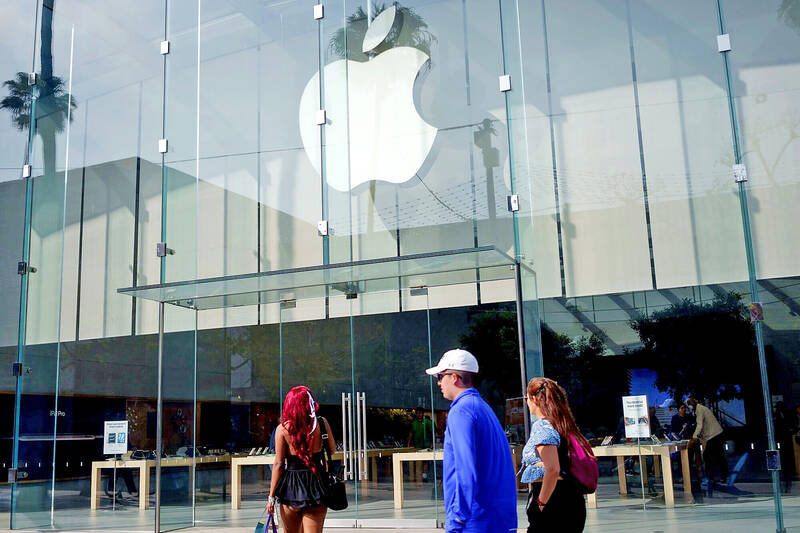Taiwanese law enforcement said that a Chinese Apple supplier has supposedly been operating illegally in Taiwan and has been trying to poach tech talent, and that a US-sanctioned Chinese firm had illegally set up operations in Taiwan.
Taiwan, which China claims as its own territory, has been stepping up efforts to stop what it views as underhanded and illegal activities by Chinese firms that are trying to steal know-how and poach talent.
The Ministry of Justice Investigation Bureau late on Thursday named Luxshare Precision Industry (立訊精密) as one of eight Chinese companies “that came to Taiwan to illegally engage in the poaching our high-tech talents.”

Photo: Bloomberg
The ministry did not give more details and Luxshare did not immediately respond to a request for comment.
Video surveillance equipment maker Zhejiang Dahua Technology Co (浙江大華技術股份有限公司), which the US added to a blacklist in 2019 over Beijing’s treatment of Muslim minorities in Xinjiang, was also on the list.
Zhejiang Dahua had set up “two private locations” in Taiwan and tried to circumvent the investigation by listing its employees under another company, the bureau said.
Zhejiang Dahua did not immediately respond to a request for comment.
Taiwan, home to Taiwan Semiconductor Manufacturing Co (台積電) and accounting for the majority of the world’s most advanced semiconductor manufacturing capacity, sees China’s efforts as a threat to its chip expertise.
“The facilitators of relevant mainland China companies in Taiwan should not be under any illusions and challenge the determination to enforce the law,” the bureau said, adding that it would “resolutely crack down on illegal business operations and the poaching of talent.”
The announcement on Thursday came after a sweep this month of Chinese tech companies that were suspected of conducting illegal operations.
Taiwanese prosecutors said that Luxshare allegedly stole commercial secrets from a Taiwanese competitor, Catcher Technology Co (可成科技), and poached its workforce to win orders from Apple.
Fourteen people have been charged, the prosecutors said.

KEEPING UP: The acquisition of a cleanroom in Taiwan would enable Micron to increase production in a market where demand continues to outpace supply, a Micron official said Micron Technology Inc has signed a letter of intent to buy a fabrication site in Taiwan from Powerchip Semiconductor Manufacturing Corp (力積電) for US$1.8 billion to expand its production of memory chips. Micron would take control of the P5 site in Miaoli County’s Tongluo Township (銅鑼) and plans to ramp up DRAM production in phases after the transaction closes in the second quarter, the company said in a statement on Saturday. The acquisition includes an existing 12 inch fab cleanroom of 27,871m2 and would further position Micron to address growing global demand for memory solutions, the company said. Micron expects the transaction to

Nvidia Corp’s GB300 platform is expected to account for 70 to 80 percent of global artificial intelligence (AI) server rack shipments this year, while adoption of its next-generation Vera Rubin 200 platform is to gradually gain momentum after the third quarter of the year, TrendForce Corp (集邦科技) said. Servers based on Nvidia’s GB300 chips entered mass production last quarter and they are expected to become the mainstay models for Taiwanese server manufacturers this year, Trendforce analyst Frank Kung (龔明德) said in an interview. This year is expected to be a breakout year for AI servers based on a variety of chips, as

Global semiconductor stocks advanced yesterday, as comments by Nvidia Corp chief executive officer Jensen Huang (黃仁勳) at Davos, Switzerland, helped reinforce investor enthusiasm for artificial intelligence (AI). Samsung Electronics Co gained as much as 5 percent to an all-time high, helping drive South Korea’s benchmark KOSPI above 5,000 for the first time. That came after the Philadelphia Semiconductor Index rose more than 3 percent to a fresh record on Wednesday, with a boost from Nvidia. The gains came amid broad risk-on trade after US President Donald Trump withdrew his threat of tariffs on some European nations over backing for Greenland. Huang further

Sweeping policy changes under US Secretary of Health and Human Services Robert F. Kennedy Jr are having a chilling effect on vaccine makers as anti-vaccine rhetoric has turned into concrete changes in inoculation schedules and recommendations, investors and executives said. The administration of US President Donald Trump has in the past year upended vaccine recommendations, with the country last month ending its longstanding guidance that all children receive inoculations against flu, hepatitis A and other diseases. The unprecedented changes have led to diminished vaccine usage, hurt the investment case for some biotechs, and created a drag that would likely dent revenues and